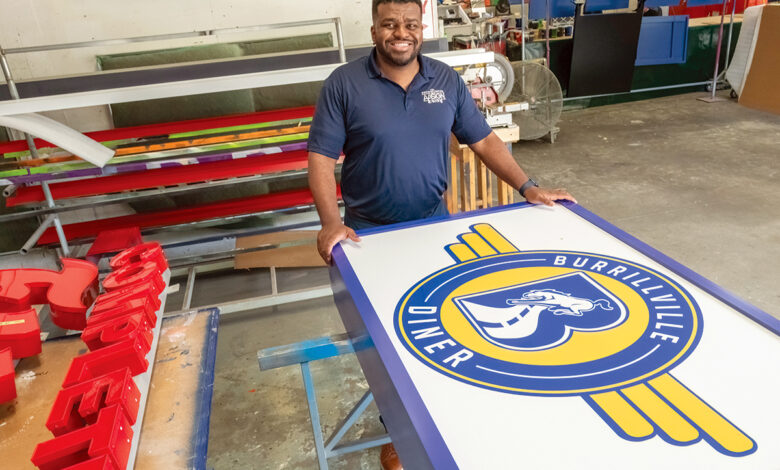Entrepreneurship
Exits that could help a minority entrepreneur

Rhode Island-based entrepreneur David Owoyemi was no stranger to startups in August 2022, when he was in the middle of launching a new enterprise, Venture Nation Inc. After all, he had first entered the entrepreneurial sphere 10 years earlier
But that summer, after connecting with Havell Rodrigues, co-founder and CEO of Providence-based firm New Majority Capital, Owoyemi would soon take on another business through an approach he hadn’t previously considered: entrepreneurship through acquisition.
“Prior to the call with Havell, it was not something on my mind,” Owoyemi said.
But curiosity and the assurance of New Majority Capital’s backing tempted Owoyemi to give the new undertaking a try.
Now, in addition to his work leading Venture Nation, Owoyemi has taken ownership of Darien Lawn & Tree Care Inc., a decades-old landscaping company based in Bridgeport, Conn.
Using this entrepreneurship-through-acquisition model, New Majority Capital, which launched in 2022, seeks to increase opportunities for underrepresented entrepreneurs, including women and people of color.
The model is simple: connect individuals who want to own a business with existing business owners who want to retire or sell their business.
But many people haven’t heard of entrepreneurship through acquisition, says Darryl Lindie, New Majority Capital co-founder and president, and those who have heard about it often lack the capital needed to buy a business.
“It’s not a new concept, but we see the opportunity to bring this to more [entrepreneurs], and that’s what we’re doing,” Lindie said. “Not everyone has a couple hundred thousand dollars to go out and use as an equity injection to fund their business.”
Lindie is in a good position to assure aspiring business owners that entrepreneurship through acquisition is a viable path forward. In July 2023, Lindie acquired his own business, AA Thrifty Sign & Awning in Warwick.
To date, New Majority Capital has now assisted 12 entrepreneurs in following this same path, Lindie says, deploying $75 million in capital along the way. The firm, based at Social Enterprise Greenhouse’s coworking space, works with entrepreneurs throughout the U.S., with five of its completed deals taking place in New England.
Additionally, New Majority Capital is working with more than 200 entrepreneurs who are actively looking to buy a business, Lindie says, including around 25 who have reached the funding and closing stages.
New Majority Capital launched with support from the Papitto Opportunity Connection and R.I. Commerce Corp., and it is also in the process of launching fundraising for NMC Fund 1, its own private-equity buyout fund.
In addition to supplying entrepreneurs with funding and guidance, New Majority Capital runs two educational courses, bETA and Succession Ready.
The firm’s outreach and education efforts extend beyond entrepreneurs, Lindie says. Oftentimes, existing business owners also haven’t heard of entrepreneurship through acquisition as an option to sell their company.
“There are so many small businesses here in Rhode Island, and a lot of them are just unaware of their options,” Lindie said. “These things are challenges, but they’re also opportunities.”
And for business owners who want to move on without shuttering their businesses, passing their work along can allow the business to carry on while providing opportunities for new owners.
In Owoyemi’s case, the previous owner of Darien Lawn & Tree Care, Jonathan Sweeney, had run the business for four decades but was nearing retirement age, Owoyemi says.
Persuading Sweeney that he was the right person to take on the business required some extra effort, Owoyemi says, particularly as he had never worked in landscaping.
“I didn’t have that background, so there was also the challenge of convincing someone you didn’t know before that you were going to take care of his baby … that you were going to do what he was hoping to achieve with the biz,” Owoyemi said.
But after closing the deal, overcoming that initial obstacle paid off immensely.
Compared with acquiring a business, starting from scratch is “not impossible, but really tough,” Owoyemi said, particularly in the technology sector. “You don’t know if people are going to buy into what you’re doing.”
Additionally, hiring a team and securing a physical location involves a lot of legwork and money, Owoyemi says.
Stepping into leadership at Darien, meanwhile, was a stark contrast. Owoyemi had 10 employees from day one, who on average had worked at the company for 10 years. There was also an established brick-and-mortar headquarters.
And though the entrepreneurship-through-acquisition model remains relatively new to Owoyemi, his experience with the concept so far has made him a proponent.
“Anyone could do this, and [do this coming from] different industries,” Owoyemi said. “It’s really life-changing.”
But that summer, after connecting with Havell Rodrigues, co-founder and CEO of Providence-based firm New Majority Capital, Owoyemi would soon take on another business through an approach he hadn’t previously considered: entrepreneurship through acquisition.
“Prior to the call with Havell, it was not something on my mind,” Owoyemi said.
But curiosity and the assurance of New Majority Capital’s backing tempted Owoyemi to give the new undertaking a try.
Now, in addition to his work leading Venture Nation, Owoyemi has taken ownership of Darien Lawn & Tree Care Inc., a decades-old landscaping company based in Bridgeport, Conn.
Using this entrepreneurship-through-acquisition model, New Majority Capital, which launched in 2022, seeks to increase opportunities for underrepresented entrepreneurs, including women and people of color.
The model is simple: connect individuals who want to own a business with existing business owners who want to retire or sell their business.
But many people haven’t heard of entrepreneurship through acquisition, says Darryl Lindie, New Majority Capital co-founder and president, and those who have heard about it often lack the capital needed to buy a business.
“It’s not a new concept, but we see the opportunity to bring this to more [entrepreneurs], and that’s what we’re doing,” Lindie said. “Not everyone has a couple hundred thousand dollars to go out and use as an equity injection to fund their business.”
Lindie is in a good position to assure aspiring business owners that entrepreneurship through acquisition is a viable path forward. In July 2023, Lindie acquired his own business, AA Thrifty Sign & Awning in Warwick.
To date, New Majority Capital has now assisted 12 entrepreneurs in following this same path, Lindie says, deploying $75 million in capital along the way. The firm, based at Social Enterprise Greenhouse’s coworking space, works with entrepreneurs throughout the U.S., with five of its completed deals taking place in New England.
Additionally, New Majority Capital is working with more than 200 entrepreneurs who are actively looking to buy a business, Lindie says, including around 25 who have reached the funding and closing stages.
New Majority Capital launched with support from the Papitto Opportunity Connection and R.I. Commerce Corp., and it is also in the process of launching fundraising for NMC Fund 1, its own private-equity buyout fund.
In addition to supplying entrepreneurs with funding and guidance, New Majority Capital runs two educational courses, bETA and Succession Ready.
The firm’s outreach and education efforts extend beyond entrepreneurs, Lindie says. Oftentimes, existing business owners also haven’t heard of entrepreneurship through acquisition as an option to sell their company.
“There are so many small businesses here in Rhode Island, and a lot of them are just unaware of their options,” Lindie said. “These things are challenges, but they’re also opportunities.”
And for business owners who want to move on without shuttering their businesses, passing their work along can allow the business to carry on while providing opportunities for new owners.
In Owoyemi’s case, the previous owner of Darien Lawn & Tree Care, Jonathan Sweeney, had run the business for four decades but was nearing retirement age, Owoyemi says.
Persuading Sweeney that he was the right person to take on the business required some extra effort, Owoyemi says, particularly as he had never worked in landscaping.
“I didn’t have that background, so there was also the challenge of convincing someone you didn’t know before that you were going to take care of his baby … that you were going to do what he was hoping to achieve with the biz,” Owoyemi said.
But after closing the deal, overcoming that initial obstacle paid off immensely.
Compared with acquiring a business, starting from scratch is “not impossible, but really tough,” Owoyemi said, particularly in the technology sector. “You don’t know if people are going to buy into what you’re doing.”
Additionally, hiring a team and securing a physical location involves a lot of legwork and money, Owoyemi says.
Stepping into leadership at Darien, meanwhile, was a stark contrast. Owoyemi had 10 employees from day one, who on average had worked at the company for 10 years. There was also an established brick-and-mortar headquarters.
And though the entrepreneurship-through-acquisition model remains relatively new to Owoyemi, his experience with the concept so far has made him a proponent.
“Anyone could do this, and [do this coming from] different industries,” Owoyemi said. “It’s really life-changing.”



